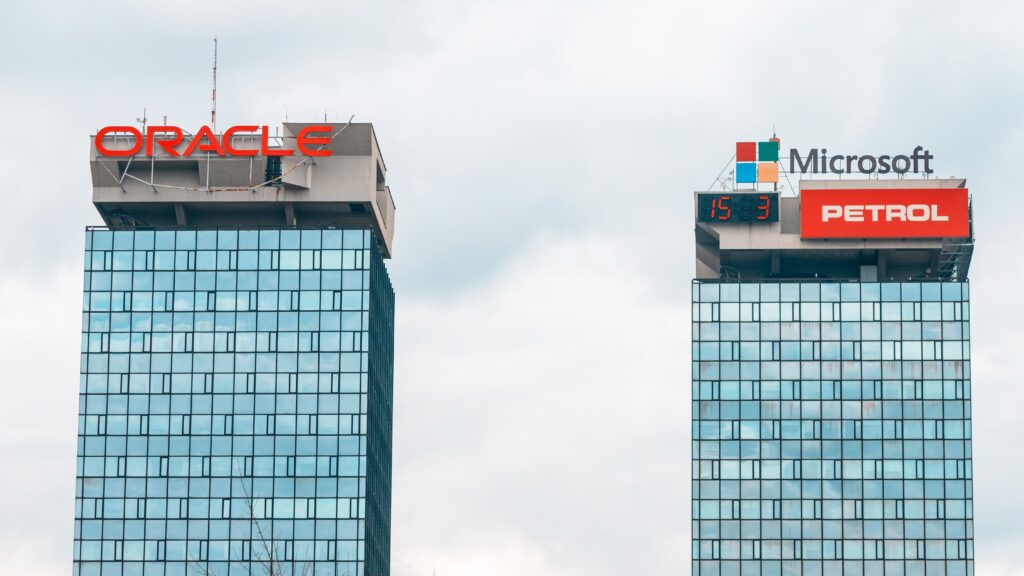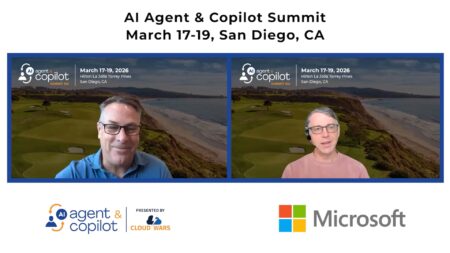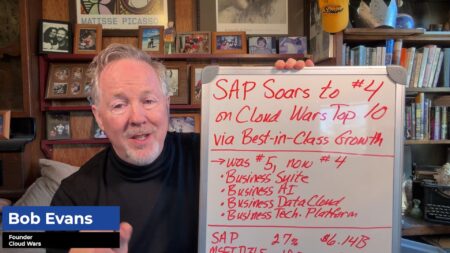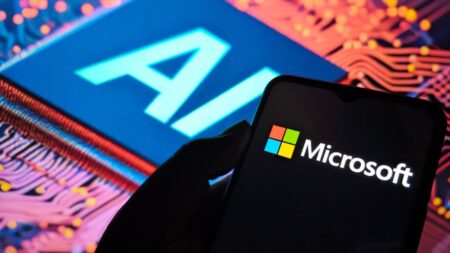
While recent news reports of Oracle winning a $30-billion agreement with OpenAI were certainly compelling, the even more remarkable story is that Larry Ellison figured out a way to displace mighty Microsoft as OpenAI’s primary Stargate partner and land a deal that will almost certainly top $100 billion and be recognized as the largest tech contract ever signed.
The angle I’d like to take with this analysis has a few moving parts, so I’m going to lay this out in three steps:
- the size and scope of the unprecedented Oracle-OpenAI deal and why I believe it is the largest contract in the history of the tech industry and possibly the largest business-to-business deal ever;
- the partial unraveling of the once-impregnable Microsoft-OpenAI partnership, and the ascension by Oracle into the lead-partner position with the ultra-hypergrowth OpenAI; and
- the implications across the tech landscape for what this new partnership means. In that context, we have to bear in mind that these aren’t simply big-number deals resulting in businesses doing what they’ve always done a little bit faster or a little bit cheaper; rather, this is absolutely about creating a future the likes of which the world has never seen.
Sure, $30 Billion Is Big — But That’s Only the Beginning
Hell’s bells, that deal could very well turn out to be the largest business contract ever signed, whether in tech or any other industry: $30 billion per year plays out to $82.2 million per day!
Beyond that, the contract is open-ended: It’s not limited to just a single year, meaning that describing it as a “$30-billion contract” shows only part of the picture. Here’s the verbatim language from Oracle’s 8-K filing, dated June 30 — I’ve highlighted the relevant part in bold:
“Safra Catz, Chief Executive Officer of Oracle Corporation (“Oracle”) plans to meet with other Oracle colleagues later today. She will say, “Oracle is off to a strong start in FY26. Our MultiCloud database revenue continues to grow at over 100%, and we signed multiple large cloud services agreements including one that is expected to contribute more than $30 billion in annual revenue starting in FY28.”
In a July 22 blog post, Stargate confirmed that it is the one laying out that staggering sum to Oracle.
Now, because it’s reasonable to suspect that OpenAI CEO Sam Altman won’t want to shop around every single year for a $30-billion cloud and AI partner, we can speculate responsibly that the partnership will run for more one year, meaning the total value will very likely hit at least $60 billion (two years) and has a strong chance of reaching $90 billion (three years).
On top of that, the statement in the Oracle 8-K says the agreement is “expected to contribute more than $30 billion in annual revenue,” which means that across a 3-year span, the Oracle-OpenAI engagement could certainly generate $100 billion in revenue for Oracle.
And after some fairly comprehensive searches, I have not been able to find any public report of any tech-industry deal of that magnitude — nor any type of recurring business-to-business contract in the range of $30 billion. I could well be wrong on that, and if so would welcome any contributions showing my mistake — I’ll highlight those in a future post.

AI Agent & Copilot Summit is an AI-first event to define opportunities, impact, and outcomes with Microsoft Copilot and agents. Building on its 2025 success, the 2026 event takes place March 17-19 in San Diego. Get more details.
So What Happened to the Microsoft-OpenAI Bromance??
Some quick history: In 2019, Microsoft invested $1 billion into OpenAI, and followed that up with another relatively low-key wide-ranging and long-term investment in 2021. Then, in early 2023, Microsoft CEO Satya Nadella and OpenAI’s Sam Altman appeared to be tying the knot for the very long term.
In a Jan. 23, 2023 blog post headlined Microsoft and OpenAI extend partnership, Microsoft wrote:
“Today, we are announcing the third phase of our long-term partnership with OpenAI through a multiyear, multibillion dollar investment to accelerate AI breakthroughs to ensure these benefits are broadly shared with the world.
This agreement follows our previous investments in 2019 and 2021. It extends our ongoing collaboration across AI supercomputing and research and enables each of us to independently commercialize the resulting advanced AI technologies.”
After noting that Microsoft would ramp up its supercomputing efforts in support of the OpenAI partnership and that Microsoft would deploy OpenAI’s models across both its enterprise and consumer products, the blog post then called out Microsoft’s status as OpenAI’s one and only cloud provider: “As OpenAI’s exclusive cloud provider, Azure will power all OpenAI workloads across research, products and API services.”
On the same day, an OpenAI blog post offered this enthusiastic outlook on the partnership:
“This multi-year, multi-billion dollar investment from Microsoft follows their previous investments in 2019 and 2021, and will allow us to continue our independent research and develop AI that is increasingly safe, useful, and powerful.”
But much has changed with OpenAI in the past two-and-a-half years, and based on a new OpenAI blog post that went up late last month, a few weeks ago, it’s clear that Oracle has supplanted Microsoft as the infrastructure partner with the inside track on helping Altman conceive and build a big chunk of the AI future.
Along Comes Larry Ellison
On the first day of President Trump’s second term, Ellison and Altman, along with Softbank CEO Masayoshi Son, appeared with the president at the White House to announce Project Stargate —OpenAI’s AI infrastructure platform — and the investment of $500 billion into that initiative, in large part from Softbank.
But the two intertwined revelations about that extraordinary meeting that immediately made the biggest impression on me were that Larry Ellison was there with Sam Altman, and that Microsoft CEO Satya Nadella was not there with Sam Altman.
Since then, Altman has appeared in a YouTube video with Oracle Cloud Infrastructure president Clay Magouyrk at the massive Stargate AI data-center construction site in Abilene, Texas, further showcasing the Oracle-OpenAI partnership.
And late last month, we saw two more unmistakable indications of the intimacy of the new Oracle-OpenAI partnership, and the less-passionate status of the Microsoft-OpenAI alliance.
- OpenAI gets only tactical mentions on Microsoft earnings call. During the many thousands of words uttered by Nadella and Microsoft CFO Amy Hood on their Q4 earnings call on July 30, the word “Stargate” never came up. And the name “OpenAI” was uttered only four times, and in each of those in a purely tactical context describing how Microsoft is using some OpenAI technology in its products and vice-versa.
- July 22 OpenAI blog post obliterates any doubt about Oracle’s very special relationship. While the blog post does indeed mention both Oracle and Microsoft, Oracle is right there in not only the headline — Stargate advances with 4.5 GW partnership with Oracle — but also the very first word in the very first sentence of the blog post: “Oracle and OpenAI have entered an agreement to develop 4.5 gigawatts of additional Stargate data center capacity in the U.S. This investment will create new jobs, accelerate America’s reindustrialization, and help advance U.S. AI leadership. It also marks a major milestone for Stargate, OpenAI’s AI infrastructure platform and long-term vision to deliver the benefits of AI to everyone.”
Oracle is cited repeatedly and glowingly throughout the blog post — and don’t forget, one of the purposes of the OpenAI blog post was to indicate that it is the partner that has agreed to begin paying Oracle more than $30 billion per year in the near future.
Meanwhile, how did OpenAI feature Microsoft and its role? This single sentence appeared 8 lines from the bottom of the post: “Microsoft will continue to provide cloud services for OpenAI, including through Stargate.”
Final Thought: The Magic of Larry Ellison
While the OpenAI partnership is without question a spectacular win for Oracle, that does not mean it’s a devastating defeat for Microsoft — as I noted earlier this month, Microsoft’s fiscal-Q4 results are in my opinion the greatest quarterly financial results any public company has ever posted.
At the same time, I find it astonishing that in a relatively short period of time — from the January 2023 joint blog posts from Microsoft and OpenAI heralding their new and extended and expanded partnership until the January 2025 appearance by Altman with Ellison at the White House —Microsoft somehow allowed its incredibly close partnership with the world’s hottest AI company to be diminished.
Few people — very, very few — could have made that happen.
But Larry Ellison is one of those — perhaps the only one —and he did it.
And as a result, Oracle’s name and not Microsoft’s is on the largest tech contract ever created —$100 billion over three years — and in fiscal 2028 OpenAI will begin paying Oracle the equivalent of $82.2 million every single day to drive unprecedented innovation in the AI Revolution.
Ask Cloud Wars AI Agent about this analysis











